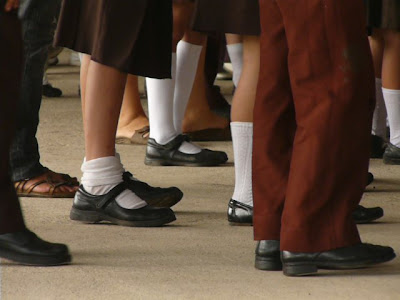 |
| The perpetrator, hiding in the ruins of Copan. |
My sister and dad came down to visit me last week. I was so excited to have them come and experience firsthand my funny life here. Char barely made it out of New York due to an impending snowstorm and arrived in San Pedro at 10pm on a Tuesday night. I hired Don Will, the father of one of our students and a man with a good heart who talks more trash about the people of Cofradia than anyone I know. After a 45 minute ride of listening to Don Will’s griping and giving the customary nods, trying to diffuse the shit-talking fest, Don Will and I arrived at the airport in his 25 year-old pickup truck of questionable functionality (one that he starts by hotwiring and he insists that he must keep it because new cars get stolen).
We arrived at 10pm and waited and waited as the rest of the passengers on her flight came through immigration. Finally Char came through, escorted by an immigration official, and I could tell by the look on her face that something was not right. I gave her a hug and said “what’s happening?” She explained that her passport is due to expire in February and that Honduras has a law that doesn’t allow people to enter the country if their passport expires within 6 months. They told her that she couldn’t legally be here and they were going to send her on the first flight back (at 7am the next day).
We were furious! Why wasn’t this something that the airline told her in the states, or why didn’t American Airlines even catch this when she booked her flight online and put in her passport information? We pulled out all of the stops with immigration, I repeated “this is ridiculous” a bunch of times to the woman from American airlines.
This tactic was unsuccessful.
We wanted to talk to the American consulate to see if they could give her some sort of extension to her passport. The woman behind the desk was not very sympathetic and said she would have to leave on the first flight out. We pleaded with her to put her on a later flight so we could at least talk to the consulate and she said there was nothing that she could do, but to come to talk to the boss-man at 5am the next morning.
Frustrated, we realized that there was nothing that we could do at this point. I hugged Char, not knowing if I would see her again in Honduras and she went off with an immigration guard to a hotel that the airline was paying for. The female guard slept in her room while I went home and scrambled, emailing our program directors, my dad who I hoped would have some consulate and I called the American Consulate’s “Emergency Line”. A US Marine Corps Sargeant answered the line and I stalled and said, “uh…. I am not sure if this is an appropriate emergency, but my sister is in San Pedro Sula, and is having problems with her passport etc...” The sergeant said, “Oh, bummer, we might be able to help, but can you do me a favor and call me right back. I picked up a phone in the other room and I can’t transfer you from here.” Um, ok, sure, I’ll call you right back. So I called him and he said, “Oh, ya, I remember now let me transfer you”, and then he hung up on me. SHIT! I called him back, “hi, it’s me again.” “Oh, sorry sir, let me try again.” This time the call went through, rang twice and a tired old man cleared his throat and answered the phone, “Hello.” This was clearly his home phone. I apologized for waking him up and explained the situation. He was very reassuring and said, “I think we can help you, but I can’t do anything at this moment. Call us at 8am tomorrow.” A glimmer of hope.
Meanwhile, my dad called his embassy contacts and I got a list of peeps from our BECA program director. Then I went to bed. It was 1 am. While this was going on, Char was shuttled to a hotel near the airport and accompanied by a female Immigration guard who slept at the hotel with her… in the bed next to her. Char then woke up at 4:30am and went back to the airport. She pleaded with the “Jefe”
to move her flight back to 1pm so she could have an opportunity to speak with the embassy. He finally gave in at 8am she called the embassy.
Fast forward to fourteen hours later, 10 hours of riding buses to and back from the capital city of Tegucigalpa, a purchase of a Honduran cellphone, a fire-drill in the embassy that almost made getting a new passport impossible, a frantic state of running around Teguce in attempts to find an ATM because their credit card machine was down and a teller that would only accept exact change and Char made it to my doorstep with a new passport.
At the end of all of this, though, I am left thinking…. Really, Honduras? Really? Why would a small, blonde, Jewish girl from New York City want to be sneaking into your country? Or why would anyone for that matter. Give us a goddamned break.
Enjoy some pictures of my dad and sister’s stay with me…
 |
| A free woman, enjoying coffee in Copan. |








